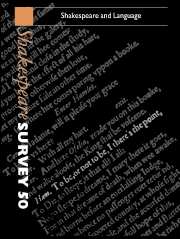Book contents
- Frontmatter
- Shakespeare’s Language and the Language of Shakespeare’s Time
- ‘I’ll plague thee for that word’: Language, Performance, and Communicable Disease
- The Language of the Spectator
- Marlowe’s Edward II: Penetrating Language in Shakespeare’s Richard II
- Hamlet’s Ear
- Secrecy and Gossip in Twelfth Night
- Shakespeare Rewriting Ovid: Olivia’s Interview with Viola and the Narcissus Myth
- ‘Voice Potential’: Language and Symbolic Capital in Othello
- Household Words: Macbeth and the Failure of Spectacle
- Erring and Straying Like Lost Sheep: The Winter’s Tale and The Comedy of Errors
- The ‘Shakespearian Gap’ in French
- Reading the Early Modern Text
- Shakespeare and the Metamorphosis of the Pentameter
- Rereading Illustrations of the English Stage
- Nietzsche’s Hamlet
- ‘Strange and woonderfull syghts’: The Tempest and the Discourses of Monstrosity
- Shakespeare Performances in England, 1996
- Professional Shakespeare Productions in the British Isles, January–December 1995
- 1 Critical Studies
- 2 Shakespeare’s Life, Times, and Stage
- 3 Editions and Textual Studies
- Books Received
- Index
The Language of the Spectator
Published online by Cambridge University Press: 28 March 2007
- Frontmatter
- Shakespeare’s Language and the Language of Shakespeare’s Time
- ‘I’ll plague thee for that word’: Language, Performance, and Communicable Disease
- The Language of the Spectator
- Marlowe’s Edward II: Penetrating Language in Shakespeare’s Richard II
- Hamlet’s Ear
- Secrecy and Gossip in Twelfth Night
- Shakespeare Rewriting Ovid: Olivia’s Interview with Viola and the Narcissus Myth
- ‘Voice Potential’: Language and Symbolic Capital in Othello
- Household Words: Macbeth and the Failure of Spectacle
- Erring and Straying Like Lost Sheep: The Winter’s Tale and The Comedy of Errors
- The ‘Shakespearian Gap’ in French
- Reading the Early Modern Text
- Shakespeare and the Metamorphosis of the Pentameter
- Rereading Illustrations of the English Stage
- Nietzsche’s Hamlet
- ‘Strange and woonderfull syghts’: The Tempest and the Discourses of Monstrosity
- Shakespeare Performances in England, 1996
- Professional Shakespeare Productions in the British Isles, January–December 1995
- 1 Critical Studies
- 2 Shakespeare’s Life, Times, and Stage
- 3 Editions and Textual Studies
- Books Received
- Index
Summary
RECONSTRUCTING THE BARD
Since the end of the Second World War the number of Shakespeare performances has increased remarkably. The English national poet is also the world's most popular dramatist, produced in an amazement of versions and with a frequency that is next to alarming. Because they are performed so often, and on something approaching a global scale, the most popular plays are arenas of impassioned scrutiny, sites of intense cultural gaze. Why did this happen?
On a material level Shakespeare's burgeoning is directly related to the rise in public subsidy for the theatre in the twentieth century. In the English-speaking countries this is exclusively a postwar phenomenon: the theatres that dominate the Shake-scene are products of a state sponsorship that began in the 1950s. But subsidy alone is not sufficient explanation, for public or private funding for the arts operates inside a larger cultural system that enables it. I suggest that in the Anglo-American examples, and in numerous European cases as well, the reason for funding and the reason for Shakespeare were intertwined: after the war the theatre was seen as a site for the recovery of the past, Shakespeare an opportunity to preserve a dying European memory.
The movement is first registered in the founding and development of international arts festivals. Though a few models existed before the war, in the late 1940s and early 1950s new types of festivals appeared over much of Europe, and their rapid development was tied from the start to a sense of reconstruction.
- Type
- Chapter
- Information
- Shakespeare Survey , pp. 29 - 40Publisher: Cambridge University PressPrint publication year: 1997



